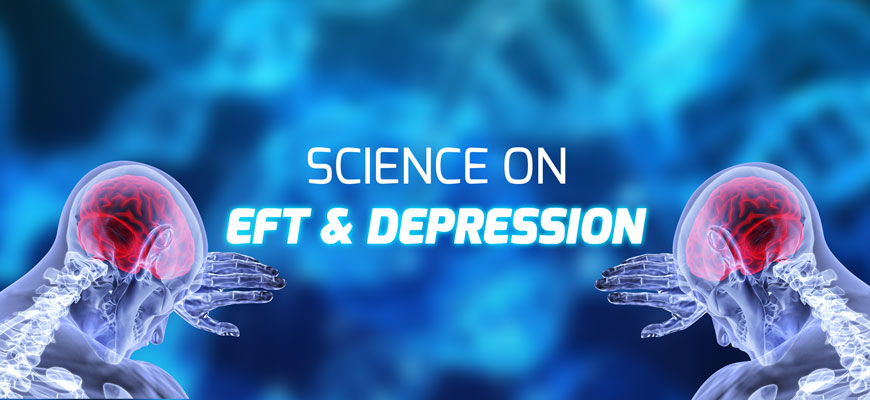Science on EFT and Depression

There has been extensive scientific research on EFT (Emotional Freedom Techniques) and its impact on depression. What does that research show? How effective is EFT on the symptoms of depression? How does EFT Compare with other therapeutic approaches?
Depression is a widespread problem around the world that can have a devastating effect on a person’s life. There have been extensive studies carried out around EFT and its use with depression. A meta – analysis is an evaluation of multiple studies in order to combine the data and assess the common results obtained.
The reason why meta -analysis is conducted is because you need to assess more than one study to evaluate the effective of any therapeutic approach. A meta – analysis is an objective study of the data connected to multiple studies to determine what interventions work. It also identifies the most effective interventions. In 2016 a meta- analysis of the research conducted on the studies related to EFT and depression was carried out.
About Depression
Depression is a common problem with over 300 million people globally thought to suffer from it (1). It is estimated that one in six people will experience depression at some point during their lifetime (2). Depression causes feelings of intense sadness, often guilt, feelings of hopelessness, and worthlessness. People with depression often feel low in energy. They can lose interest in doing things that previously gave them pleasure. They can lack motivation and drive.
Concentration, memory and decision making can be affected by depression. It also can affect sleeping patterns. To get a diagnosis of depression a person needs to have symptoms for greater than two weeks. Depression can range from mild to severe. It can be a serious disease that can lead to some people thinking suicidal thoughts and in some cases completing suicide (3).
Meta-Analysis Conclusions
The meta-analysis was conducted using the data from twelve randomised controlled trials (RCT) and eight outcome studies. The studies occurred between the years 2005 and 2015. The conclusions found that EFT was highly effective in decreasing the symptoms of depression. The results occurred in different populations and settings. Improvements stayed over time. EFT worked in both groups and-one-on one situations. Treatment times required ranged from one to ten sessions.
Diaphragmatic breathing (4) is a recommended technique for working with depression. EFT achieved better results than diaphragmatic breathing. EMDR (Eye Movement Desensitisation and Reprocessing) is a psychotherapy approach developed in the 1990’s by Francine Shapiro. It is an evidence-based technique used to treat PTSD (Post Traumatic Stress Disorder) recommended by NICE.
NICE (5) is the National Institute for Health and Care Excellence which issues guideline for the National Health Service in the UK as to which treatments should be used for specific problems. EMDR is recommended for the treatment of PTSD by NICE. It is also used in the treatment of depression (6). The results obtained by EFT were found to be comparable to those of EMDR (Eye Movement Desensitisation and Reprocessing). EFT had a greater long term impact on the symptoms of depression when compared to a meta-analysis of anti-depressants. (7)
Summation
From the research results, EFT works well as a treatment for depression. When compared to other approaches commonly used for treating depression, it was found to be as good as or in most cases more effective than many commonly used approaches.
References
- https://www.who.int/news-room/fact-sheets/detail/depression
- https://www.psychiatry.org/patients-families/depression/what-is-depression
- https://www.webmd.com/depression/guide/what-is-depression#1
- https://www.healthline.com/health/diaphragmatic-breathing#steps-to-do
- https://www.nice.org.uk
- https://www.everydayhealth.com/depression/eye-movement-therapy-for-depression.aspx
- A Systematic Review and Meta – Analysis of Randomised and non randomised Trials of Clinical Emotional Freedom Techniques (EFT) for the Treatment of Depression. https://www.ncbi.nlm.nih.gov/pubmed/27843054
For more information about EFT, including articles and how to learn EFT or become an AAMET Accredited Practitioner visit my website: https://taniaaprince.com
Connect with me on Facebook: https://www.facebook.com/EFTCourses
